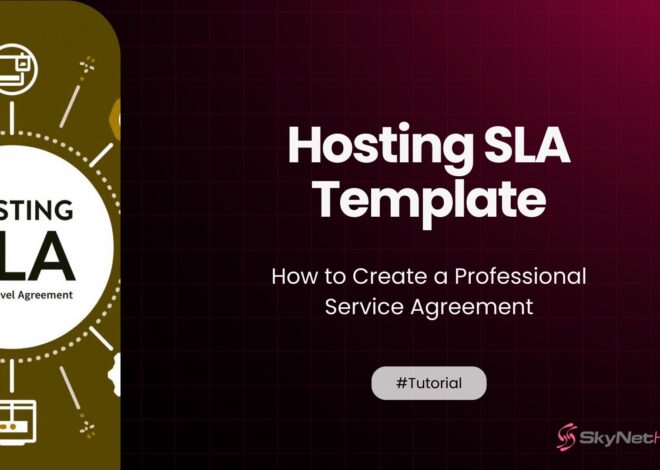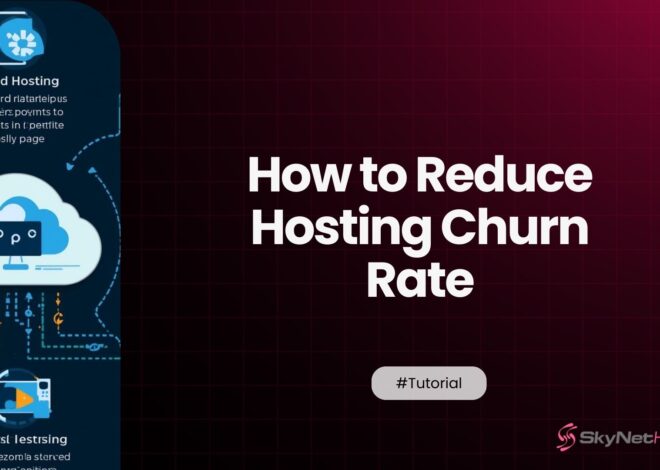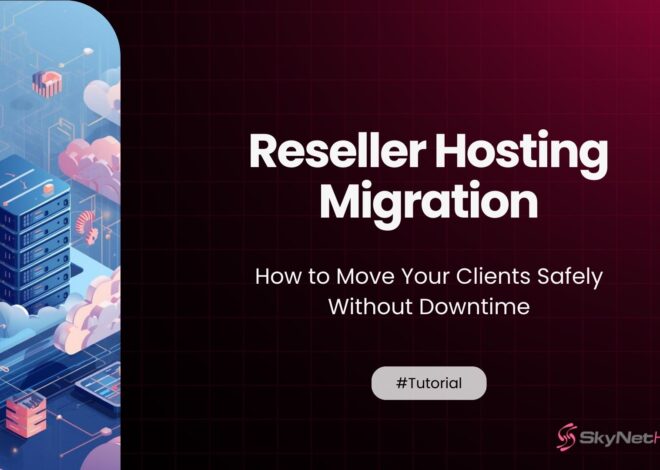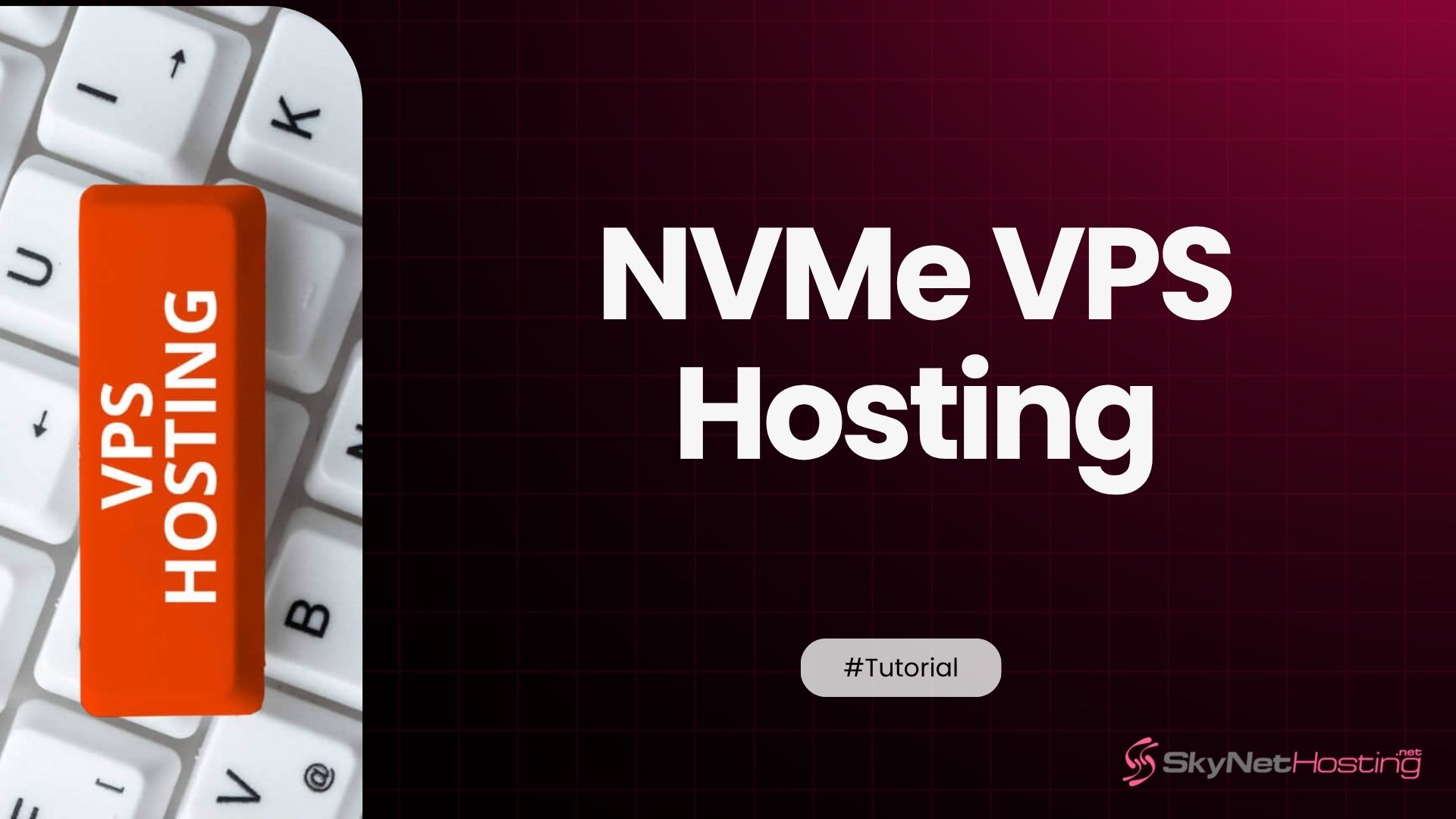
NVMe VPS Hosting: The Future of Speed and Performance
TL;DR for NVMe VPS Hosting
- NVMe VPS hosting replaces older HDD and SATA SSD storage with NVMe SSDs, delivering dramatically faster read/write speeds and lower latency, making a huge difference for online businesses and performance-sensitive applications.
- NVMe drives use the PCIe connection, enabling much higher throughput and IOPS compared to SATA, which results in tangible improvements for dynamic websites, eCommerce, agencies, and SaaS platforms.
- Benchmark comparisons show NVMe storage can be up to 10x faster in read speeds and 6x faster in write speeds than traditional SSDs, with significantly lower latency, providing quick page loads and stable server environments.
- Switching to NVMe VPS hosting boosts database performance, leads to better SEO rankings via faster website speeds, and keeps sites stable during heavy traffic, all of which can directly affect conversions and user experience.
- Ideal users include developers running complex applications, eCommerce businesses needing speedy checkouts, agencies hosting multiple sites, and SaaS providers requiring superior database performance.
- Choosing a NVMe VPS provider should focus on modern hardware, sufficient RAM, uptime guarantees, global data centers, and strong support—Skynethosting.net offers ultra-fast NVMe SSDs, free migrations, and 24/7 expert help with predictable pricing.
If you’re running a serious online business, you know that every millisecond counts. A slow website can kill conversions, hurt your SEO rankings, and send potential customers running to your competitors. For years, I’ve seen businesses struggle with sluggish performance, not realizing their hosting is the bottleneck. The move from Hard Disk Drives (HDDs) to Solid-State Drives (SSDs) was a game-changer, but now we’re in a new era. The future is here, and it’s called NVMe.
As someone who’s been in the hosting industry for over a decade, I can tell you that switching to NVMe VPS hosting is one of the most impactful upgrades you can make for your website or application. It’s not just an incremental improvement; it’s a quantum leap in speed and reliability.
This guide will walk you through everything you need to know about NVMe VPS hosting. We’ll explore what it is, how it works, and why it’s a must-have for anyone serious about performance. By the end, you’ll understand why this technology is becoming the new standard for high-speed VPS hosting and how to choose the right provider for your needs.
What Is NVMe VPS Hosting?
Let’s break it down. A Virtual Private Server (VPS) gives you dedicated resources (CPU, RAM, storage) within a larger physical server, offering more power and control than shared hosting. NVMe VPS hosting simply means your virtual server’s storage is powered by NVMe drives instead of older technologies like SATA SSDs or traditional HDDs.
Understanding NVMe (Non-Volatile Memory Express) Technology
NVMe, or Non-Volatile Memory Express, is a communication protocol designed specifically for flash-based storage. Think of it as a super-highway for data. Older protocols like SATA were built for mechanical hard drives and couldn’t keep up with the speed of modern SSDs. NVMe was created to unleash the full potential of flash memory, and the results are staggering.
How NVMe Drives Revolutionize VPS Performance
By connecting directly to the server’s motherboard via the PCIe slot, NVMe drives bypass the bottlenecks of older SATA connections. This direct line of communication allows for massively parallel data processing. While a SATA SSD can handle one command queue with up to 32 commands, an NVMe drive can manage over 65,000 queues, each with 65,000 commands. This enables your VPS to handle significantly more data requests simultaneously, which is crucial for dynamic websites and applications.
Why NVMe is Faster Than Traditional SSD or HDD Storage
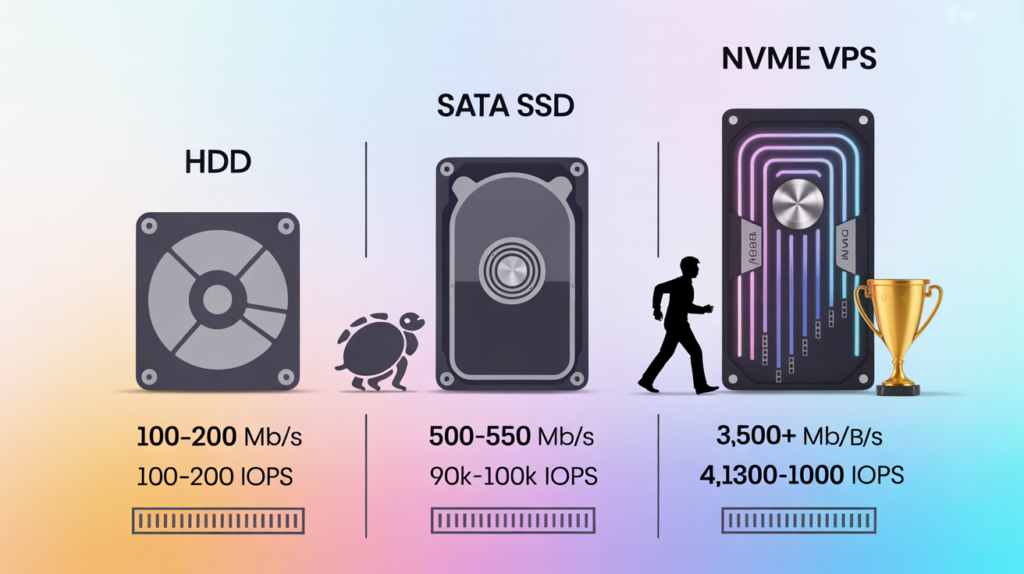
It all comes down to speed and architecture.
- HDD (Hard Disk Drive): Uses spinning platters and a mechanical arm to read/write data. It’s slow, prone to physical failure, and simply outdated for performance-critical tasks.
- SATA SSD (Solid-State Drive): Uses flash memory, making it much faster than an HDD. However, it’s limited by the SATA interface, which was designed for those spinning disks. It’s like putting a sports car engine in a family sedan—you’re not getting its full power.
- NVMe SSD: Also uses flash memory but communicates via the high-speed PCIe interface. This direct connection removes the SATA bottleneck, allowing for breathtaking read/write speeds and dramatically lower latency. It’s like putting that sports car engine on a Formula 1 racetrack.
How Does NVMe VPS Hosting Work?
The magic behind NVMe’s incredible speed lies in its architecture, which is built to work in harmony with modern multi-core processors and high-speed memory.
The Role of PCIe Connections in Faster Data Transfer
The PCI Express (PCIe) slot is a high-speed serial computer expansion bus standard. It’s the same interface used for high-performance components like graphics cards. By plugging directly into the PCIe slot, NVMe drives have a much wider, faster “pipe” to transfer data to and from the CPU compared to the narrow SATA interface. This results in significantly higher throughput and bandwidth.
How NVMe Boosts Read/Write Operations for VPS Users
For a VPS, faster read/write operations (measured in IOPS, or Input/Output Operations Per Second) mean everything happens quicker. When a visitor loads your website, the server reads files from the storage drive. When a customer places an order, data is written to your database. An NVMe VPS server can handle hundreds of thousands of these operations per second, while a SATA SSD is often limited to tens of thousands. This massive boost in IOPS performance means your server can respond to requests almost instantly.
Real-World Examples of Performance Gains
Let’s make this tangible. For an eCommerce site, this means product pages load in a flash, and the checkout process is seamless, even during a Black Friday sale. For a developer running a complex application, it means faster database queries and quicker code compilation. For an agency hosting multiple WordPress sites, it means all client sites remain snappy and responsive, even under heavy load. The difference is not subtle; it’s a night-and-day improvement in user experience.
Why Choose NVMe VPS Hosting Over SSD VPS?
While SATA SSDs were a big step up from HDDs, the jump to NVMe is just as significant. If you’re deciding between a standard SSD VPS and an NVMe virtual private server, the performance data speaks for itself.
Benchmark Comparison – NVMe vs. SATA SSD
On average, NVMe SSDs deliver:
- Up to 10x faster read speeds than SATA SSDs.
- Up to 6x faster write speeds than SATA SSDs.
- Significantly higher IOPS, allowing for more simultaneous operations.
These aren’t just theoretical numbers. They translate directly into faster page loads, quicker database responses, and a more stable server environment.
Latency, Throughput, and Bandwidth Differences
- Latency: NVMe offers drastically lower latency (the time it takes to process a data request). We’re talking microseconds for NVMe versus milliseconds for SATA. This VPS latency reduction is key to a responsive user experience.
- Throughput: NVMe can handle a much larger volume of data per second. A typical PCIe 4.0 NVMe drive can achieve speeds over 7,000 MB/s, while a SATA SSD tops out around 550 MB/s.
- Bandwidth: The PCIe interface provides far more bandwidth, allowing more data to flow simultaneously without creating a traffic jam.
Ideal Use Cases for NVMe VPS Hosting
While any website can benefit from NVMe, it’s a game-changer for:
- High-traffic websites and blogs.
- eCommerce stores with large product catalogs.
- Database-intensive applications (like CRM or ERP systems).
- SaaS platforms requiring real-time data processing.
- Any site where speed is a competitive advantage.
Who Should Use NVMe VPS Hosting?
If your business relies on web performance, you should be considering an NVMe VPS. Here are a few groups that see the most significant benefits.
Developers Running Heavy Applications
If you’re a developer, you know the pain of waiting for builds to compile or databases to respond. An NVMe VPS for developers provides the raw IOPS performance needed to speed up your workflow, allowing you to iterate faster and be more productive.
eCommerce Businesses Needing Faster Checkout
For an online store, speed is money. Studies consistently show that faster page load times lead to higher conversion rates. NVMe ensures your product images load instantly and your checkout process is frictionless, reducing cart abandonment and boosting revenue.
Agencies Hosting Multiple Client Websites
As an agency, your reputation depends on the performance of the sites you manage. Hosting multiple clients on a single server can strain resources. The high-speed nature of an NVMe server ensures that all sites remain fast and responsive, even if one experiences a sudden traffic spike.
SaaS Companies Requiring Database-Intensive Performance
SaaS platforms often live and die by the speed of their database. NVMe storage provides the ultra-fast IOPS and low latency needed to handle complex queries and serve data to thousands of users simultaneously, ensuring a smooth and reliable service.
What Are the Benefits of NVMe VPS Hosting?
Switching to a high-speed VPS hosting plan with NVMe storage brings a host of benefits that directly impact your bottom line.
- 10x Faster Website Load Times: In some cases, websites can see a tenfold improvement in speed compared to traditional HDD hosting, and a significant boost over SATA SSDs.
- Enhanced I/O Performance for Databases: Your databases will run smoother and faster, which is critical for dynamic, data-driven websites and applications.
- Improved SEO Rankings: Google has confirmed that site speed is a ranking factor. A faster website can lead to better visibility in search results.
- Greater Stability Under Heavy Traffic: NVMe drives can handle traffic spikes without breaking a sweat, ensuring your site remains stable and available during peak periods.
How NVMe VPS Hosting Improves Core Web Vitals
Core Web Vitals are a set of metrics Google uses to measure user experience. A faster server has a direct, positive impact on these crucial scores.
- Better LCP (Largest Contentful Paint) Scores: LCP measures how quickly the main content of a page loads. Faster server response times, thanks to NVMe, directly improve this metric.
- Reduced Server Response Times (TTFB): Time to First Byte (TTFB) is a foundational speed metric. NVMe’s low latency dramatically reduces TTFB, giving you a head start on a fast-loading page.
- Improved User Experience and Retention: A fast, responsive site keeps users engaged. They’re more likely to stay longer, view more pages, and convert, leading to higher retention and lower bounce rates.
How to Choose the Right NVMe VPS Hosting Provider
Not all NVMe hosting is created equal. When comparing providers, look beyond the headline price.
What Features to Look For (CPU, RAM, Storage, Uptime)
Your server is a balanced system. Ultra-fast storage won’t help if your CPU is slow or you don’t have enough RAM. Look for a provider offering a good balance of modern CPUs (like Intel Xeon or AMD EPYC), sufficient RAM, and scalable NVMe storage. Also, demand a high uptime guarantee—99.9% should be the absolute minimum.
Importance of Global Data Centers for Performance
Where your server is located matters. To minimize latency for your visitors, choose a provider with data centers close to your target audience. A provider with a global network gives you the flexibility to serve a worldwide customer base effectively.
Comparing Providers and Pricing
When looking at NVMe VPS hosting plans, compare the resources you get for the price. Some providers offer cheap plans but skimp on CPU power or support. Look for transparent, affordable NVMe VPS hosting that doesn’t compromise on quality or service.
Why Skynethosting.net Is the Best Choice for NVMe VPS Hosting
After years in the industry, I’ve seen what makes a great host. Skynethosting.net consistently delivers on the key factors that matter most for performance-driven businesses.
- Powered by Ultra-Fast NVMe SSD Storage: We use top-of-the-line NVMe drives to ensure you get the absolute best performance possible.
- Global Data Centers for Minimal Latency: With a wide selection of locations across the USA, Europe, Asia, and more, you can host your site close to your customers for lightning-fast speeds.
- Free Website Migration and Setup: We know moving can be a hassle. Our team of experts will handle the migration for you, ensuring a smooth and seamless transition with zero downtime.
- 24/7 Expert Support with 99.9% Uptime Guarantee: Our friendly, experienced support team is always available to help you. We stand behind our infrastructure with a rock-solid uptime guarantee.
How to Migrate Your Existing VPS to NVMe VPS
Ready to make the switch? The process is straightforward, especially with the right support.
Backup and Transfer Process
The first step is always to create a full backup of your current site. Once that’s done, the data can be transferred to your new NVMe server.
Verifying Compatibility Before Migration
Our team will work with you to ensure your application and server configuration are fully compatible with the new environment, preventing any unexpected issues after the move.
Using Skynethosting.net’s Free Migration Support
Don’t worry about the technical details. Just provide us with your current hosting credentials, and our migration experts will take care of the entire process for free. We’ll clone your site, test it on the new server, and help you switch your DNS to complete the move.
NVMe VPS Hosting vs. Cloud Hosting
It’s a common question: should I choose a VPS or go with a cloud hosting platform?
- Speed and Performance: An NVMe VPS often provides better and more consistent performance for a given price point because you have dedicated resources. With cloud hosting, you’re often sharing resources in a much larger pool, which can sometimes lead to “noisy neighbor” issues.
- Scalability and Pricing: Cloud hosting is known for its on-demand scalability, but this can come with complex and unpredictable pricing. An NVMe VPS offers predictable monthly costs, with the ability to easily upgrade your plan as you grow.
- When to Upgrade: If you outgrow your VPS, the next logical step is a dedicated NVMe server. This gives you an entire physical server to yourself for maximum power and control.
Upgrade to the Future of VPS Performance
Switching to NVMe VPS hosting is one of the smartest upgrades you can make for your online business or development project. It’s a direct investment in speed, reliability, and user experience—three pillars of success in the digital world. You’re not just buying faster hardware; you’re gaining a competitive edge.
With Skynethosting.net’s NVMe-powered VPS hosting, you get lightning-fast speed, unmatched reliability, and enterprise-grade performance, all at an affordable price.
👉 Experience the next generation of hosting today at Skynethosting.net — where NVMe VPS means pure speed and power.

